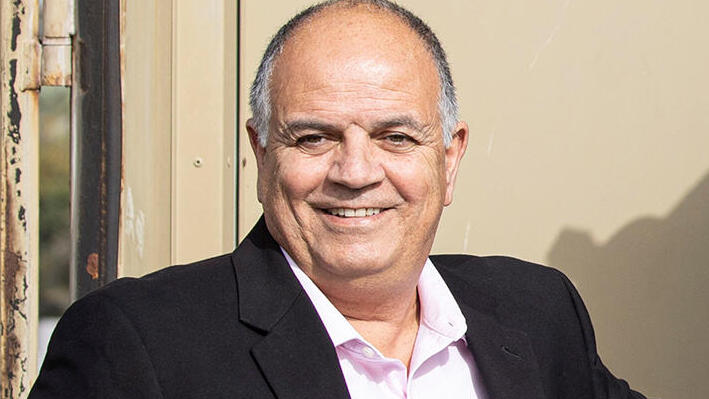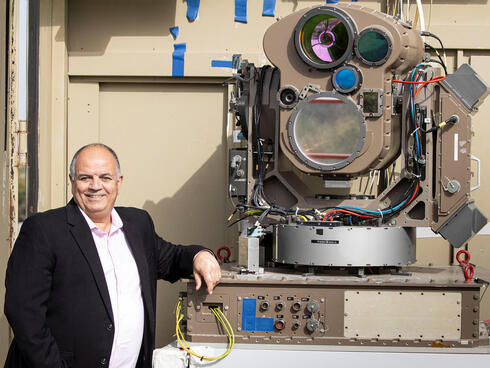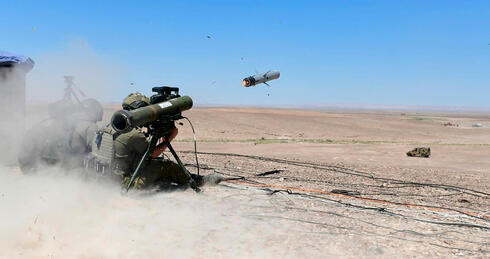
Rafael CEO backs IPO plans, says hypersonic missile interceptor in advanced development
Defense contractor eyes public listing as it accelerates development of new interceptor system to counter next-generation missile threats.
Rafael CEO Yoav Turgeman confirmed on Wednesday Calcalist’s exclusive report from two and a half weeks ago about the defense company’s intention, as a fully government-owned enterprise, to go public, and about the contacts Chairman Yuval Steinitz is holding with government ministries on the matter. According to him, “I am in favor of Rafael’s IPO because it operates in a competitive, dynamic, and fast-paced market, while government companies by nature are subject to state regulation, which burdens them. The IPO will be good for Rafael and good for the state.”
Turgeman made the remarks in light of Rafael’s financial results for the second quarter of this year, during which the company’s sales increased by 20.4% compared to the corresponding quarter last year, reaching more than NIS 4.7 billion (approximately $1.41B). Its order backlog has also risen since the same quarter last year to almost NIS 66 billion ($20B), fueled by the continued strong flow of weapons systems orders from armies around the world and the IDF.
Rafael’s growing interest in going public comes in response to the Government Companies Authority’s efforts to promote the IPO of Israel Aerospace Industries (IAI), also fully owned by the state. The authority is seeking agreements with the Ministries of Finance and Defense for the IPO of 30% of IAI at a valuation of NIS 100 billion.
Rafael fears that an IAI-only offering would harm its position in the defense market, leaving it as the sole large defense company subject to onerous state regulations, making it harder to compete with IAI and Elbit Systems. “As a competitive company, we need to respond quickly to market changes, acquire companies, and take steps that meet fast-moving processes,” Turgeman said.
Counting on American assistance
A significant portion of Rafael’s operations are classified, which has so far prevented the company from being valued. In addition, these classified activities could complicate approvals from the defense establishment for its IPO. Despite this, Turgeman said, “Just as classified issues were overcome in IAI’s IPO, with a little more effort the same can be done for Rafael. Other large defense companies worldwide are publicly traded and keep their secrets. Many in Israel support Rafael’s IPO, though some oppose it, and we are holding discussions with them. I estimate that once we are public, we will surpass even our competitors in terms of activity. The leading measure in companies like ours is the backlog of orders, and with the addition of U.S. special assistance to Israel, we are already very close to Elbit Systems’ backlog. I estimate that in a very short time we will close the gap with Elbit.”
Turgeman was referring to the aid package provided by U.S. President Joe Biden to Israel following the war, which includes $5.2 billion to equip the IDF with David’s Sling and Iron Dome interceptors manufactured by Rafael, as well as laser interceptor systems set to be delivered to the Air Force’s air defense system in the coming months.
Rafael’s strong performance is also reflected in its profitability: in the first half of the year, net profit rose 68% to NIS 612 million ($184M) compared to the first half of 2024. In the second quarter, net profit reached NIS 340 million ($102M), compared to NIS 132 million ($40M) in the same period last year. “Our net profit increased 2.5 times year-on-year in the quarter. Rafael is growing rapidly, even compared to other defense companies. Just days after closing our Q2 numbers, we already received new orders worth more than NIS 5 billion,” Turgeman said.
Related articles:
One of those new orders came from Germany and was reported by Rafael earlier this week, amounting to over €350 million. The deal covers advanced kits Litening 5 observation and weapons guidance systems, which will be integrated into the German Air Force’s Typhoon aircraft. The order is especially notable given Chancellor Friedrich Merz’s recent announcement of an arms embargo on Israel, in response to Israel’s offensive in Gaza and Prime Minister Benjamin Netanyahu’s continued dismissal of European and international calls to end the war, now approaching its two-year mark.
According to Turgeman, “Despite the global uproar against Israel, Rafael’s order rate is higher than the same period last year. The world saw Rafael’s systems perform in the 12-day war with Iran. Many countries want weapons with proven battlefield performance. Without the uproar, sales would have been even stronger. Not a single order has been canceled. Even if some projects slowed, I believe once the fighting in Gaza ends, business will normalize quickly.”
According to Rafael, about half of its Q2 sales were domestic, as ongoing demand in Israel and abroad has accelerated production line expansions at its main northern sites. “Last year we hired 2,000 new employees, and in the first half of this year, about 800 more. We also increased R&D spending by 30% to safeguard Israel’s future technological edge,” Turgeman noted.
While Rafael is finalizing laser-based systems to intercept rockets, mortars, and UAVs for IDF operational use, technology that could revolutionize the battlefield, Turgeman also pointed to rising global momentum in hypersonic missiles, which travel at least five times the speed of sound and pose challenges to existing defense systems. About two and a half years ago, Rafael unveiled its “SkySonic” development plan, designed to intercept hypersonic missiles, which may also be deployed in Israel in the coming years. Iran has openly declared ambitions in this field, and China is rapidly advancing with a portfolio of new missiles it claims possess hypersonic capabilities.
“We currently know how to counter all existing threats in the arena, and ‘SkySonic is at the peak of its development,” Turgeman said. “We have achieved core capabilities in this area, and the decision to accelerate development depends on budget and resource allocation by the defense establishment. With proper support, we could speed up development.”
Elbit also surges
Earlier this month, Elbit Systems reported Q2 revenues of about $2 billion, up 21% from the same quarter last year. Its order backlog reached $23.8 billion, a 43% jump since the outbreak of the war nearly two years ago.
The only major Israeli defense company yet to release Q2 results is Israel Aerospace Industries. The lack of external directors prevents board approval of the reports, exposing the company to a Securities Authority threat that if results are not released by the end of August, its Tel Aviv Stock Exchange bonds could be placed in default. The crisis stems from political battles between Defense Minister Israel Katz and Minister for Government Companies Dudi Amsalem, who have delayed signing off on new appointments.

